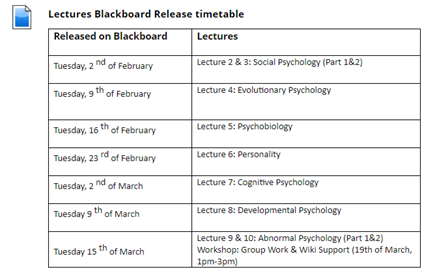 As leader of our PGCTHE programme, I keep an eye out for resources to help staff teach effectively. These include webinars, podcasts, online toolkits, publications and more. Topics include active learning, online/blended teaching, accessibility/inclusion, and effective learning design based on cognitive science. Below I’ve listed items that came to my attention in the past week. In the interest of clarity, our policy is to show the titles and descriptions in the language of delivery.
As leader of our PGCTHE programme, I keep an eye out for resources to help staff teach effectively. These include webinars, podcasts, online toolkits, publications and more. Topics include active learning, online/blended teaching, accessibility/inclusion, and effective learning design based on cognitive science. Below I’ve listed items that came to my attention in the past week. In the interest of clarity, our policy is to show the titles and descriptions in the language of delivery.
- 29/3/2021 IUADigEd, Join the Conversation (Inclusivity in Digital Learning: Student Perspectives)
- 29/3/2021 QAA, Launch Education for Sustainable Development: Guidance for UK Higher Education Providers
- 1/4/2021 University of Kent, What can we learn from distance learning? Supporting teaching in the post-COVID world, Digitally Enhanced Education Webinars
- 7/4/2021 Transforming Assessment, Lessons Learned from Systemically Implementing Competency Based Assessment
- 20/4/2021 TILE Network, Dr Bryan Dewsbury on “Equity Practices in Higher Education – The Importance of Dialogue”
- 26/4/2021 Westminster Insight, Mental Health in Higher Education Digital Conference
- 4/5/2021 Assessment in Higher Education (AHE), two webinars offered through Transforming Assessment: Finding Your Confidence in the Numbers: Developing Self-Assessment Accuracy through an Adapted TBL Process, and An Evaluation of Serious Gaming as a Formative Assessment Tool
- 2/7/2021 ALT, Academic Practice and Technology (APT2021) conference
- 8-9/7/2021 University of Liverpool, L&T Conference: Reflect, Revise, and Reimagine
- ALT (22/3/2021), Learning Technology in the age of COVID-19
- Assessment for Learning at King’s, How can I use team and group work?
- Byrne, N. & Butcher, C. (22/12/2020), An Introduction to Teaching in UK Higher Education, Routledge
- Hardman, P. (15/3/2021), Educators’ experience of digitally-enabled learning and teaching during Covid-19, WonkHE blog
- LTEU, Aberystwyth University, Vevox Polling Tool
- Mihai, A. (24/3/3021), A Year Later…, The Educationalist
- Peat, J., Broadbent, J., & Gormley, C. (24/3/2021), Time to Refocus, SEDA blog
- Sambell, K. & Brown, S. (19/3/2021), A compendium of examples of authentic assessment in practice from diverse disciplines, available in Covid-19 Assessment Collection
- Teach First (25/7/2015), Open edX 2017: Applying Blooms Taxonomy to Open edX, Conference presentation recording with Philippa Hardman
- University of Plymouth, 7 Steps Series: guides help you plan and teach effectively
- WonkHE (3/2021), University staff experience of digitallyenabled learning during Covid-19
Please see the Staff Training booking page for training offered by the LTEU and other Aberystwyth University staff. I hope you find this weekly resource roundup useful. If you have questions or suggestions, please contact our team at lteu@aber.ac.uk. You may also wish to follow my Twitter feed, Mary Jacob L&T.

 On Thursday 25th March, the Learning and Teaching Enhancement Unit will be hosting the second Academy Mini-Conference online of this academic year. The theme will be ‘Embedding Well-being in the Curriculum’, where will explore the links between mental well-being and learning and how this could help to maximise success for both students and staff.
On Thursday 25th March, the Learning and Teaching Enhancement Unit will be hosting the second Academy Mini-Conference online of this academic year. The theme will be ‘Embedding Well-being in the Curriculum’, where will explore the links between mental well-being and learning and how this could help to maximise success for both students and staff.


 Aberystwyth University is taking part in the Digital Experience Insights project aiming to explore our students’ experiences of technology. The project is based on online surveys designed by Jisc and used by different institutions across the UK.
Aberystwyth University is taking part in the Digital Experience Insights project aiming to explore our students’ experiences of technology. The project is based on online surveys designed by Jisc and used by different institutions across the UK.
